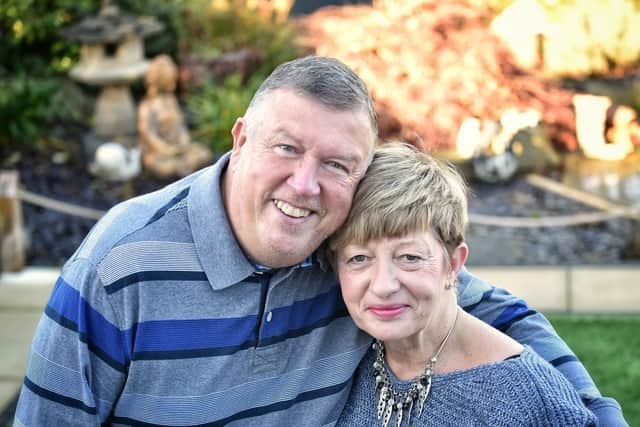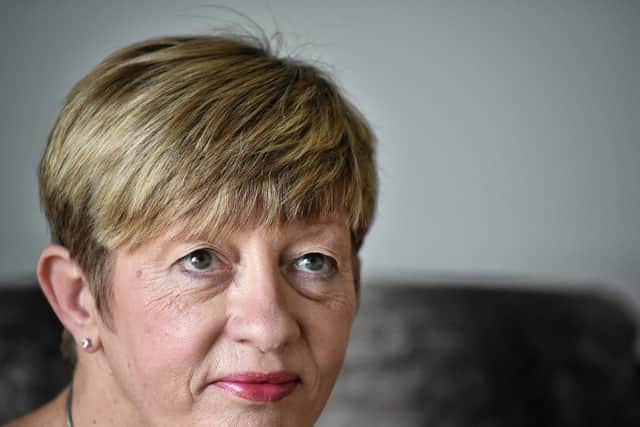'The deadliest common cancer:' My only symptom was indigestion


Jackie, now 60, of Limebrest Avenue in Thornton had been suffering with pains she described as a "dull ache" in her lower back, which came and went over the course of a few months.
Between February and November 2016, she visited her GP on numerous occasions with the complaints, but each time it was concluded as indigestion and she was prescribed medication.
Advertisement
Hide AdAdvertisement
Hide AdEventually, doctors agreed to refer Jackie to the gastroenterology department at Blackpool Victoria Hospital, who suspected a case of gallstones.


She said: "I assumed because the pain would come and go, that it couldn't be anything too serious.
"I was getting fed up of being prescribed heartburn and indigestion tablets, so I decided to keep going until I found out the answer.
"In the end I was sent for a scan to try to find these gallstones the doctors thought I had, but they told me instead that I had chronic pancreatitis."
Advertisement
Hide AdAdvertisement
Hide AdA diagnosis had finally been received, but sadly all was not as it seemed as Jackie was told to go back to hospital for another endoscopic scan.


"I will never, ever forget that day,” she said.
"It was May 3 2017, and I was told a tumour had been found on my pancreas.
“It had been missed on my previous scan, because they pancreas can be so difficult to see if you aren’t actually looking for something there.
"It didn't even occur to me that I could have cancer."
Jackie had no idea whether the tumour was cancerous or not, and after the scan she carried on as normal and took off to Lincoln for a cycling and walking holiday with her husband, Steven.
Advertisement
Hide AdAdvertisement
Hide AdNot one to worry until she “was 110% sure something was wrong,” she received a phone call ten days later.
“They told me I had pancreatic cancer, and I didn’t understand how.
“I’d never smoked, I rarely drank, and my only symptoms were a bit of backache and indigestion.
“To be honest, I’d never even heard of pancreatic cancer until a few years earlier.
Advertisement
Hide AdAdvertisement
Hide Ad“Nothing I had ever read about it had been good- it was always the worst possible outcomes.
“I remembered that.”
Steven Armitage, Jackie’s husband, had been a police officer for over 30 years, but “passed out on the floor” when they heard the bad news.
She said: “I think deep down we knew it was going to be a worst-case scenario.
“We took all the information from the nurse, and Steven was just in complete and utter shock, he passed out straight onto the floor.
Advertisement
Hide AdAdvertisement
Hide Ad“He’s been fine since, he’s so supportive and that is incredibly important during things like this.
“You need to have support to get through it.”
After her cancer diagnosis, Jackie eventually underwent surgery to remove her tumour.
She had a “pylorus-preserving whipple procedure”, which involved removing part of her pancreas, gallbladder, and duodenum (the first part of the small intestine.)
The operation would usually also remove part of the stomach and pylorus (outlet of the stomach,) but because of the location of the tumour it was not necessary for her.
Advertisement
Hide AdAdvertisement
Hide AdAfterwards, from September 2017 to February 2018, Jackie received chemotherapy treatment, and now has a scan every six months and blood tests every three months.
Scans showed that after six months of chemotherapy, on February 12 2018, no tumour could be found.
She said: “I don’t think doctors will ever tell me it’s gone away completely.
“I have known four different people who have had pancreatic cancer and it killed them all.
Advertisement
Hide AdAdvertisement
Hide Ad“My next-door neighbour had it and died, and so did my best friend of over forty years, Ann.
“The saddest thing is, she was the one who read about all of my symptoms and told me to push for more appointments at the doctors.
“She didn’t recognise those symptoms in herself, and it was too late for her, her tumour was too big.”
“I was fit and healthy before I was diagnosed and I truly believe that helped with my recovery.”
Advertisement
Hide AdAdvertisement
Hide AdNow, Jackie wants to warn others about the dangers of the disease, and how important it is to visit a doctor the minute you suspect your symptoms could be more serious.
She said: “For anyone who has a low, dull ache in their back, has had sudden weight loss, or a feeling of indigestion that doesn’t go away, please go to see a doctor.
“Go persistently, don’t take no for an answer, and demand referrals if you need to.
“It could save your life.”
About pancreatic cancer
Around 10,000 people are diagnosed with pancreatic cancer every year in the UK, and around 180 of them will be from the Lancashire and South Cumbria area.
Advertisement
Hide AdAdvertisement
Hide Ad93% of people who get a pancreatic cancer diagnosis will die within 5 years.
Survival has not improved for more than 50 years and the UK is falling further behind the rest of Europe, with fewer patients receiving surgery to remove their tumour- the only potential cure.
A spokesman for pancreatic cancer UK said: “It is a cancer emergency like no other: 1 in 4 people with pancreatic cancer will die within a month of diagnosis.
It is completely unacceptable that people with pancreatic cancer face such deadly odds.”